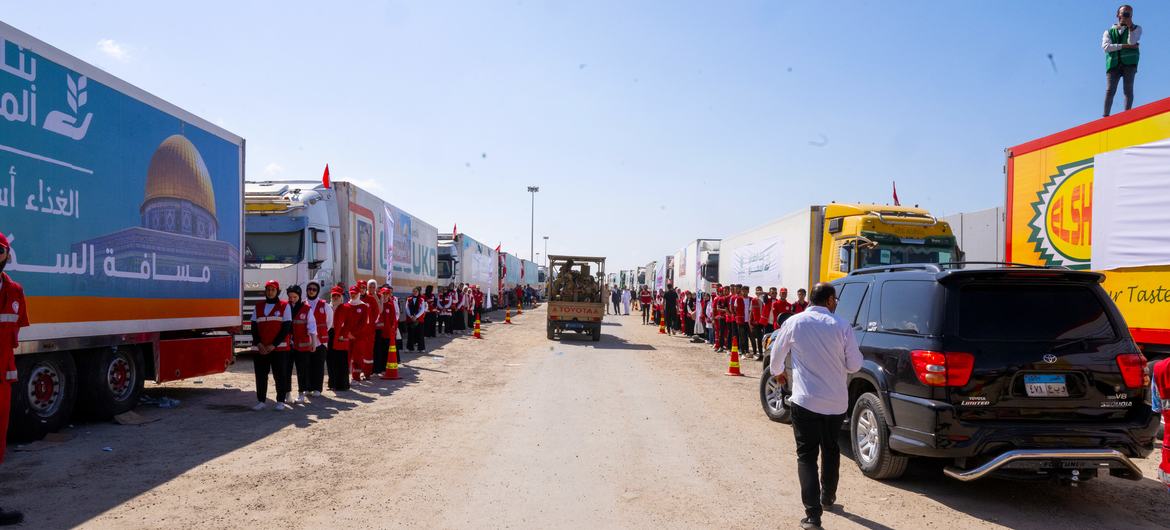A third convoy of 20 humanitarian trucks carrying food, water and medical aid entered Gaza on Monday via Egypt’s Rafah crossing, in line with a U.S.-Israeli deal announced Sunday evening aimed at maintaining aid desperately needed humanitarian aid to the war-torn enclave. But no fuel has been allowed into the territory and hospital generators are expected to be exhausted by Wednesday, according to humanitarian agencies.
Israel is blocking the entry of fuel into Gaza as it claims Hamas will divert its fuel supplies to continue its missile attacks on Israeli towns, ongoing since the October 7 surprise incursion by Hamas gunmen into 22 communities Israeli forces, killing more than 1,300 people, most of them civilians. Israel has since cut off Gaza’s access to water and electricity from its grid, and bombarded the enclave with unprecedented intensity.
Today, the lives of Palestinian patients, including 130 premature babies dependent on hospital incubators, are threatened by fuel shortages, according to the United Nations Office for the Coordination of Humanitarian Affairs in the Occupied Palestinian Territory. Gaza’s desalination plant also now relies on fuel supplies from emergency generators to produce drinking water, since Israel cut off access to its electricity grid.
Every second counts for around 130 premature babies #Gaza who rely on fuel to operate their incubators.
The severe shortage of fuel and medical supplies has already forced the closure of seven critical incubators at Shifa Hospital.
Read more: https://t.co/l4X27fLrhv pic.twitter.com/7scYtKwqwF
– OCHA TPO (Palestine) (@ochaopt) October 23, 2023
Dr Tamer Al-Shaer, head of shelters in southern Gaza for the United Nations Palestine Relief Agency (UNRWA), on Monday described the situation as catastrophic.
Nearly 420,000 people are accommodated in 93 UNRWA shelters in the Middle, Khan Younis and Rafah regions, an increase of 14,000 (3.5%) in the last 24 hours, UNRWA reported on Monday evening.
This includes 3,190 pregnant women and 18,000 people with chronic illnesses need medical assistance, al-Shaer said.
Shelters are operating at 2.57 times their planned capacity, according to the humanitarian agency.
#Gaza “The situation is frankly catastrophic”
Tamer explains how our medical teams are doing absolutely everything they can to provide care to more than 400,000 displaced people in the country. @UNRWA shelters – including providing medical support to 3,000 pregnant women #Listentotheirvoices pic.twitter.com/wIAmpl0VWA
– UNRWA (@UNRWA) October 23, 2023
More than 5,000 people have been killed in Gaza over the past two weeks, 40% of them children, according to the Gaza Health Ministry.
Separately, UNRWA reported Monday that 35 of its personnel had been killed in Gaza since October 7, when Hamas first attacked Israel, triggering an intense aerial bombardment of the territory by Israel in response.
We are at a loss for words.
We pay tribute to our 35 colleagues who were killed#Gaza since October 7.
We cry and we remember.
It’s not just numbers. They are our friends and colleagues.
Many were teachers in our schools. @UNRWA mourn this immense loss. pic.twitter.com/rDHrEMWv6y
– UNRWA (@UNRWA) October 23, 2023
According to the UN, another 20 trucks entered the territory on Monday, meaning 54 humanitarian trucks entered the territory. But it is a drop in the bucket of needs for an estimated 1.6 million Palestinians who are stuck and unable to leave the territory, U.N. officials say.
Before the October 7 conflict, 100 trucks delivered aid to the territory each day, as nearly a third of Gaza residents were food insecure before the conflict intensified.
Five United Nations (UN) agencies, including the World Health Organization (WHO) and UNICEF, warned Over the weekend, water production was at 5% of normal levels, food was running low, and hospitals were overwhelmed with the injured.
With so much of Gaza’s civilian infrastructure damaged or destroyed during nearly two weeks of constant bombardment, including shelters, health facilities, water, sanitation and electrical systems, time is running out before Death rates are skyrocketing due to epidemics and lack of health care. capacity for care, they warned.
We call for a humanitarian ceasefire, as well as immediate and unrestricted humanitarian access throughout Gaza to enable humanitarian actors to reach civilians in need, save lives and prevent further suffering human. Humanitarian aid flows must be large-scale and sustained, and allow all Gaza residents to preserve their dignity.
In the meantime there has been a escalation of violence in the West Bank. Some 95 people were reported killed, mainly in clashes between armed Palestinians and Israeli troops, but also in clashes with Israeli settlers. On Sunday, an Israeli airstrike hit the al-Ansar mosque inside the Jenin refugee camp, according to UNRWA.
Image credits: Eskinder Debebe/UN.
Combat the infodemic in health information and support health policy reporting from the Global South. Our growing network of journalists in Africa, Asia, Geneva and New York connect regional realities to major global debates, with evidence-based, open-access news and analysis. To make a personal or organizational contribution, click here on PayPal.
#Hospital #generators #dry #Israel #blocks #fuel #entering #Gaza #Health #Policy #Watch
Image Source : healthpolicy-watch.news

